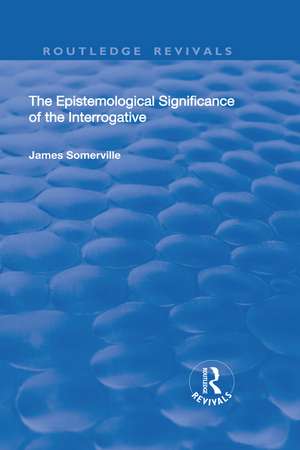The Epistemological Significance of the Interrogative: Routledge Revivals
Autor James Somervilleen Limba Engleză Paperback – 29 oct 2019
| Toate formatele și edițiile | Preț | Express |
|---|---|---|
| Paperback (1) | 216.07 lei 6-8 săpt. | |
| Taylor & Francis – 29 oct 2019 | 216.07 lei 6-8 săpt. | |
| Hardback (1) | 684.99 lei 6-8 săpt. | |
| Taylor & Francis – 24 noi 2017 | 684.99 lei 6-8 săpt. |
Din seria Routledge Revivals
- 9%
 Preț: 801.69 lei
Preț: 801.69 lei - 8%
 Preț: 432.15 lei
Preț: 432.15 lei -
 Preț: 153.81 lei
Preț: 153.81 lei -
 Preț: 230.80 lei
Preț: 230.80 lei -
 Preț: 294.72 lei
Preț: 294.72 lei -
 Preț: 258.72 lei
Preț: 258.72 lei - 9%
 Preț: 764.34 lei
Preț: 764.34 lei - 9%
 Preț: 903.41 lei
Preț: 903.41 lei -
 Preț: 296.10 lei
Preț: 296.10 lei -
 Preț: 342.36 lei
Preț: 342.36 lei - 9%
 Preț: 606.35 lei
Preț: 606.35 lei -
 Preț: 317.54 lei
Preț: 317.54 lei - 9%
 Preț: 764.28 lei
Preț: 764.28 lei -
 Preț: 257.00 lei
Preț: 257.00 lei -
 Preț: 238.40 lei
Preț: 238.40 lei -
 Preț: 259.47 lei
Preț: 259.47 lei - 9%
 Preț: 903.80 lei
Preț: 903.80 lei -
 Preț: 326.26 lei
Preț: 326.26 lei -
 Preț: 258.66 lei
Preț: 258.66 lei -
 Preț: 294.97 lei
Preț: 294.97 lei -
 Preț: 308.89 lei
Preț: 308.89 lei -
 Preț: 199.85 lei
Preț: 199.85 lei -
 Preț: 347.49 lei
Preț: 347.49 lei -
 Preț: 295.04 lei
Preț: 295.04 lei -
 Preț: 389.39 lei
Preț: 389.39 lei -
 Preț: 257.00 lei
Preț: 257.00 lei -
 Preț: 343.21 lei
Preț: 343.21 lei - 9%
 Preț: 640.90 lei
Preț: 640.90 lei - 9%
 Preț: 619.48 lei
Preț: 619.48 lei -
 Preț: 228.88 lei
Preț: 228.88 lei -
 Preț: 257.67 lei
Preț: 257.67 lei -
 Preț: 245.10 lei
Preț: 245.10 lei -
 Preț: 258.52 lei
Preț: 258.52 lei -
 Preț: 258.72 lei
Preț: 258.72 lei -
 Preț: 368.93 lei
Preț: 368.93 lei -
 Preț: 246.37 lei
Preț: 246.37 lei - 9%
 Preț: 832.07 lei
Preț: 832.07 lei -
 Preț: 258.66 lei
Preț: 258.66 lei -
 Preț: 286.98 lei
Preț: 286.98 lei - 18%
 Preț: 695.85 lei
Preț: 695.85 lei - 9%
 Preț: 934.94 lei
Preț: 934.94 lei - 5%
 Preț: 231.22 lei
Preț: 231.22 lei -
 Preț: 267.15 lei
Preț: 267.15 lei -
 Preț: 200.66 lei
Preț: 200.66 lei - 9%
 Preț: 638.61 lei
Preț: 638.61 lei -
 Preț: 259.68 lei
Preț: 259.68 lei - 9%
 Preț: 1038.45 lei
Preț: 1038.45 lei -
 Preț: 389.43 lei
Preț: 389.43 lei -
 Preț: 302.13 lei
Preț: 302.13 lei -
 Preț: 294.72 lei
Preț: 294.72 lei
Preț: 216.07 lei
Preț vechi: 258.66 lei
-16% Nou
Puncte Express: 324
Preț estimativ în valută:
41.34€ • 43.17$ • 34.22£
41.34€ • 43.17$ • 34.22£
Carte tipărită la comandă
Livrare economică 04-18 aprilie
Preluare comenzi: 021 569.72.76
Specificații
ISBN-13: 9781138727571
ISBN-10: 1138727571
Pagini: 284
Dimensiuni: 156 x 234 mm
Greutate: 0.45 kg
Ediția:1
Editura: Taylor & Francis
Colecția Routledge
Seria Routledge Revivals
Locul publicării:Oxford, United Kingdom
ISBN-10: 1138727571
Pagini: 284
Dimensiuni: 156 x 234 mm
Greutate: 0.45 kg
Ediția:1
Editura: Taylor & Francis
Colecția Routledge
Seria Routledge Revivals
Locul publicării:Oxford, United Kingdom
Cuprins
Contents: Preface; Introduction; The interrogative; Questions and enquiry; Asking questions; Stating answers; Interrogation; Requesting; Interrogative form; Logic and the different types of question; Appendix: the logic questions; Epilogue; Bibliography; Index.
Descriere
This title was first published in 2002. This book challenges prevalent assumptions regarding questions and enquiry. It argues that instead of trying to understand questions by reference to knowledge, knowledge can be conceived by reference to the distinctive logical form exhibited by questions. Interrogative logical form has not hitherto been recognised by logicians or philosophers generally. By providing an analysis which can serve as the basis for a fresh start in epistemology, this book breaks new ground.
